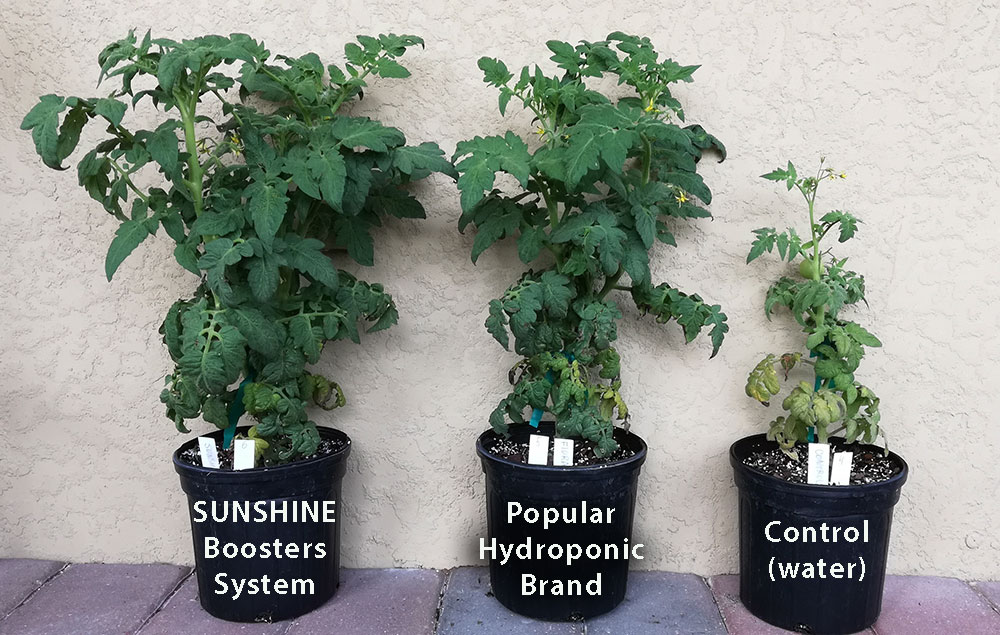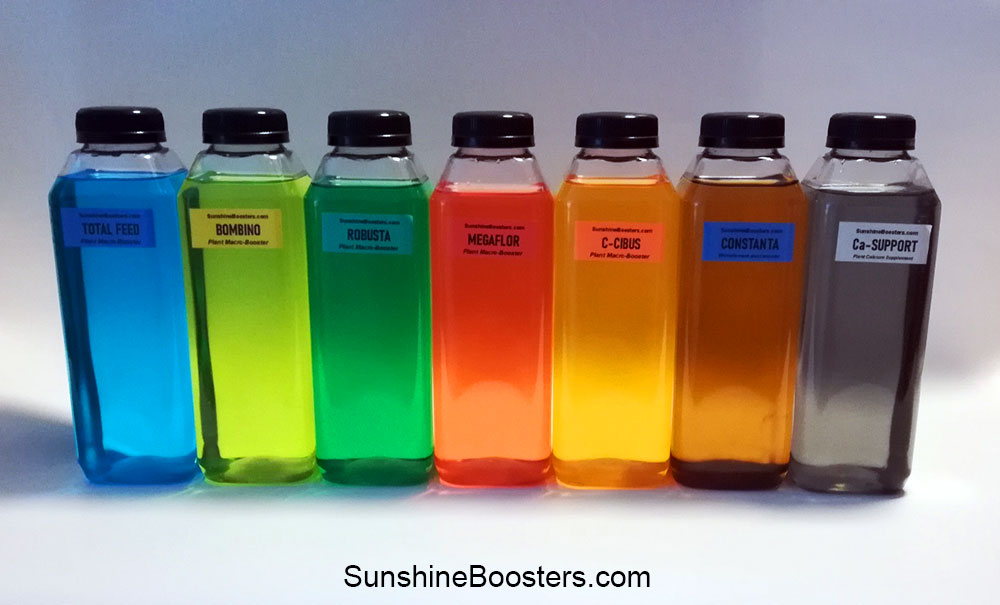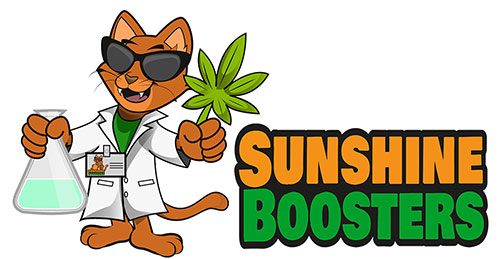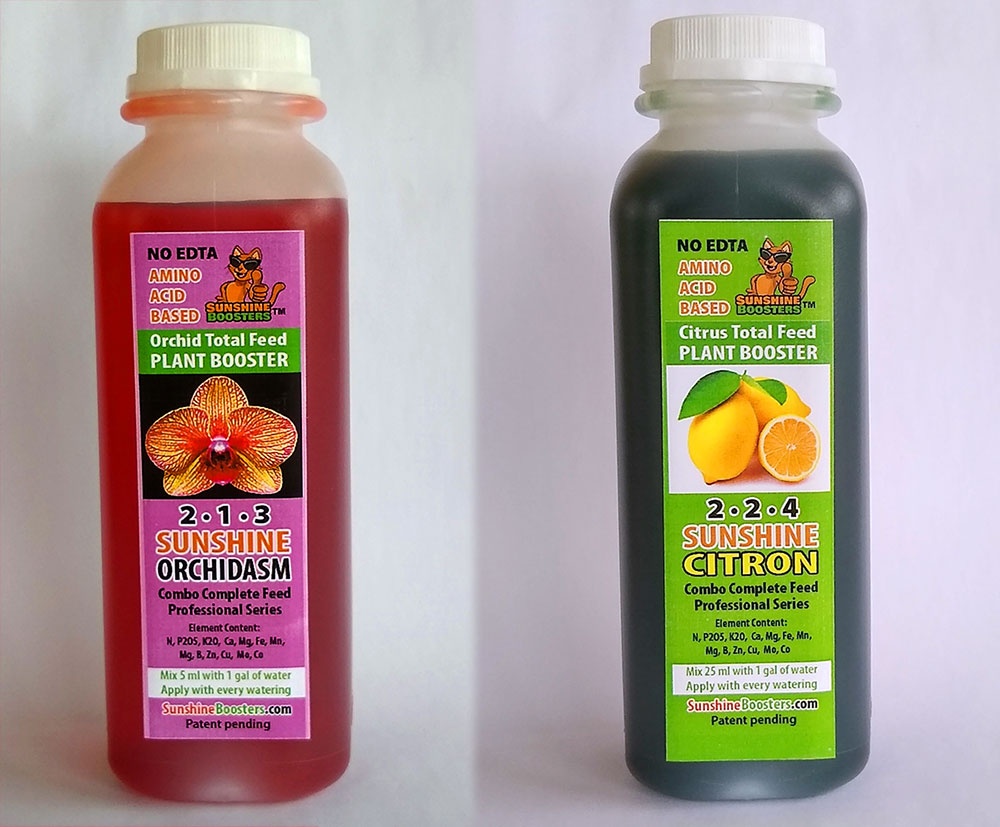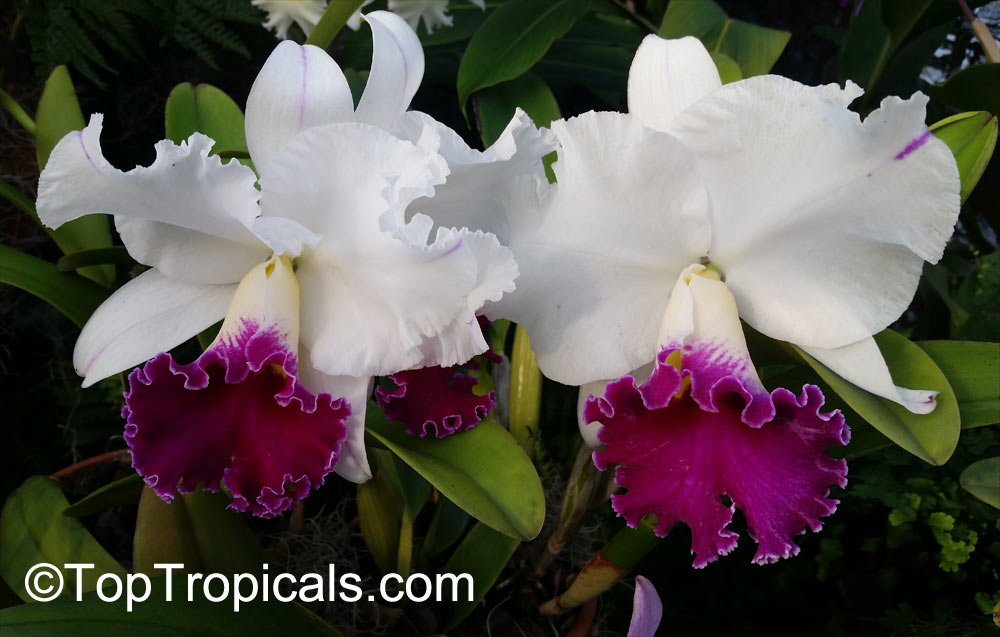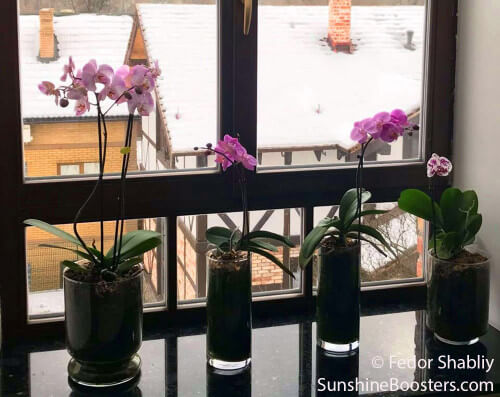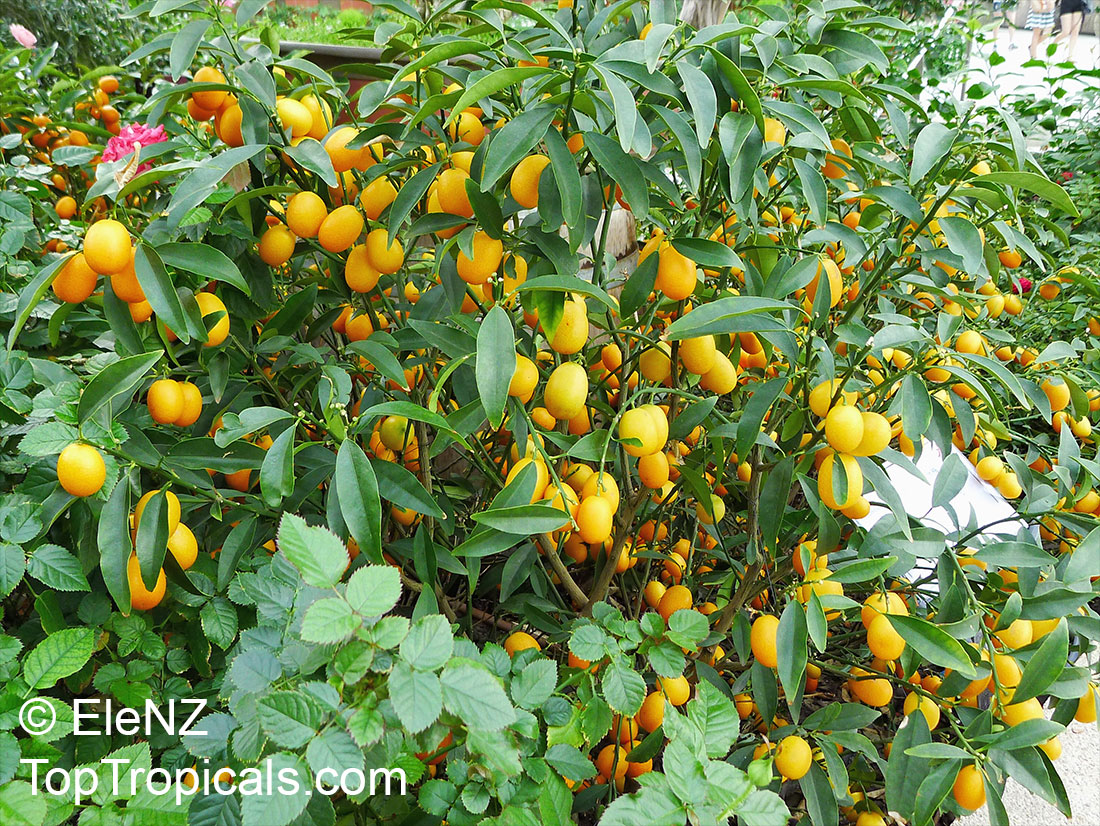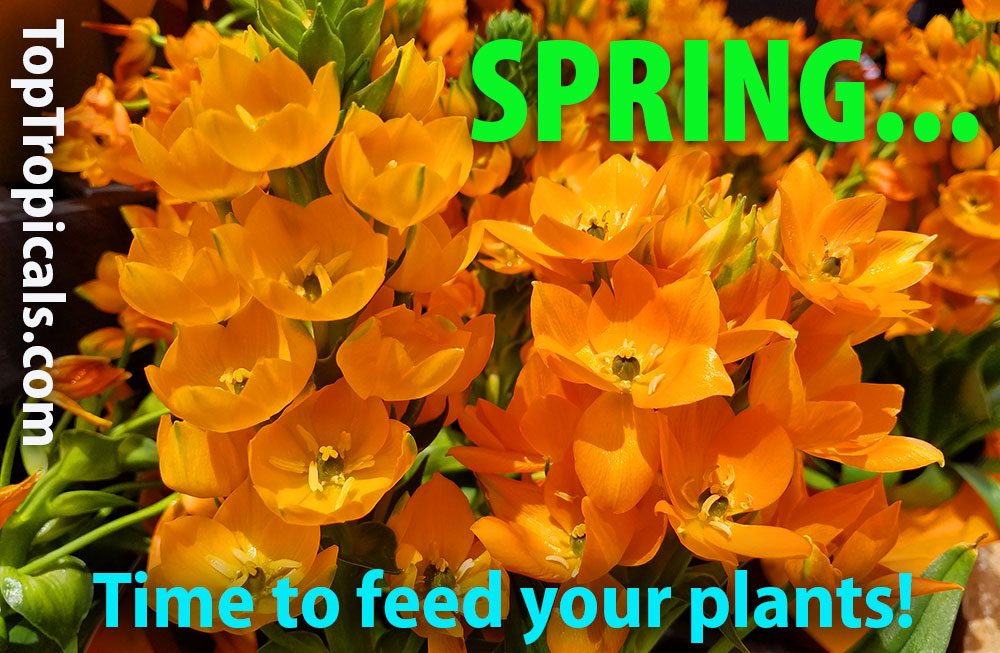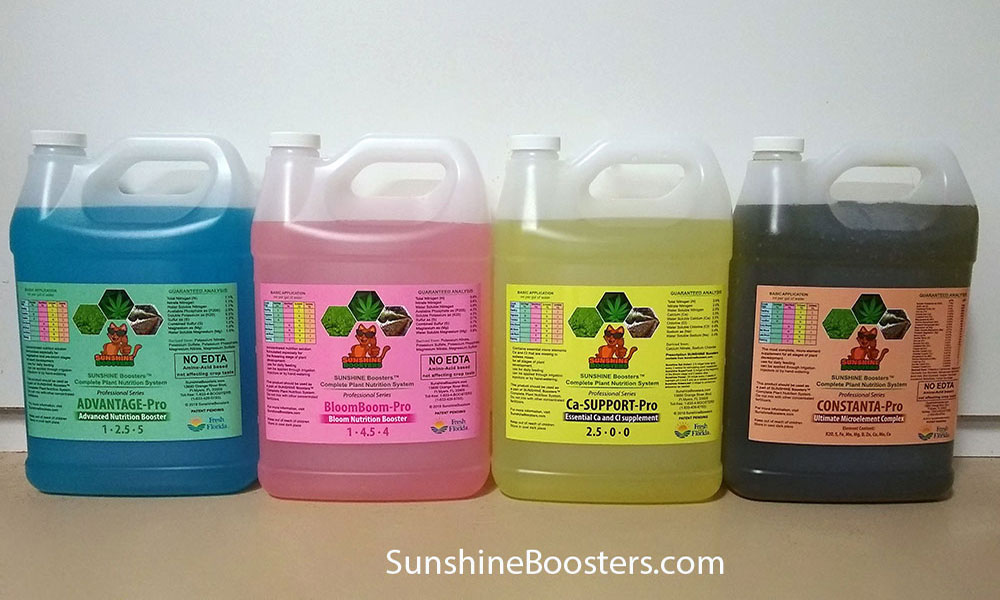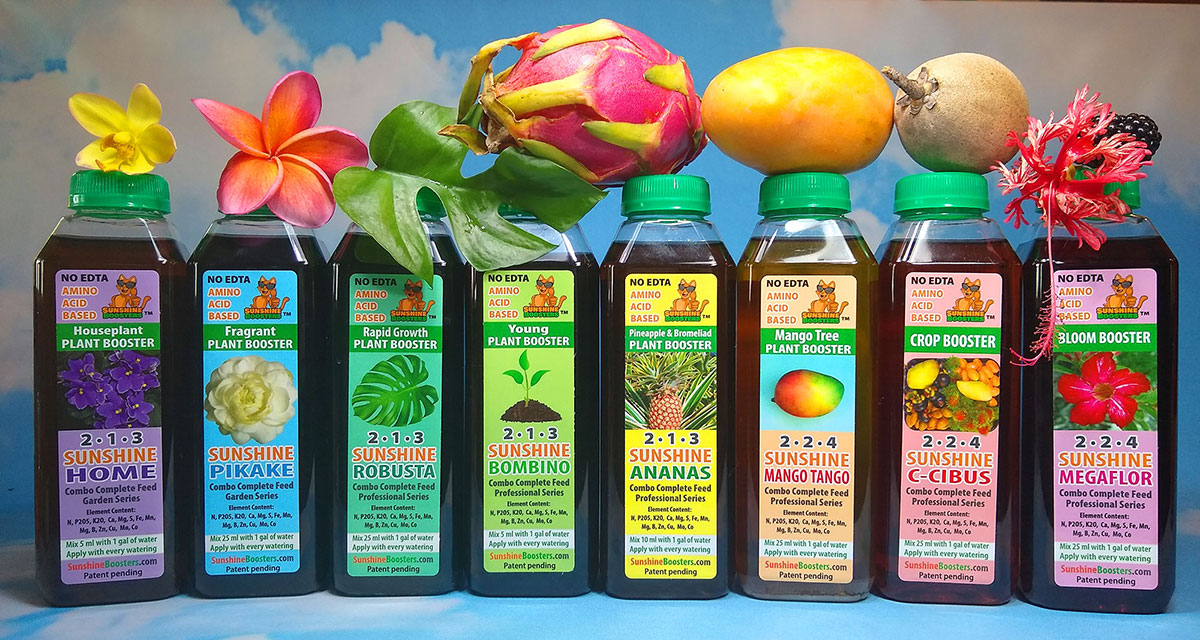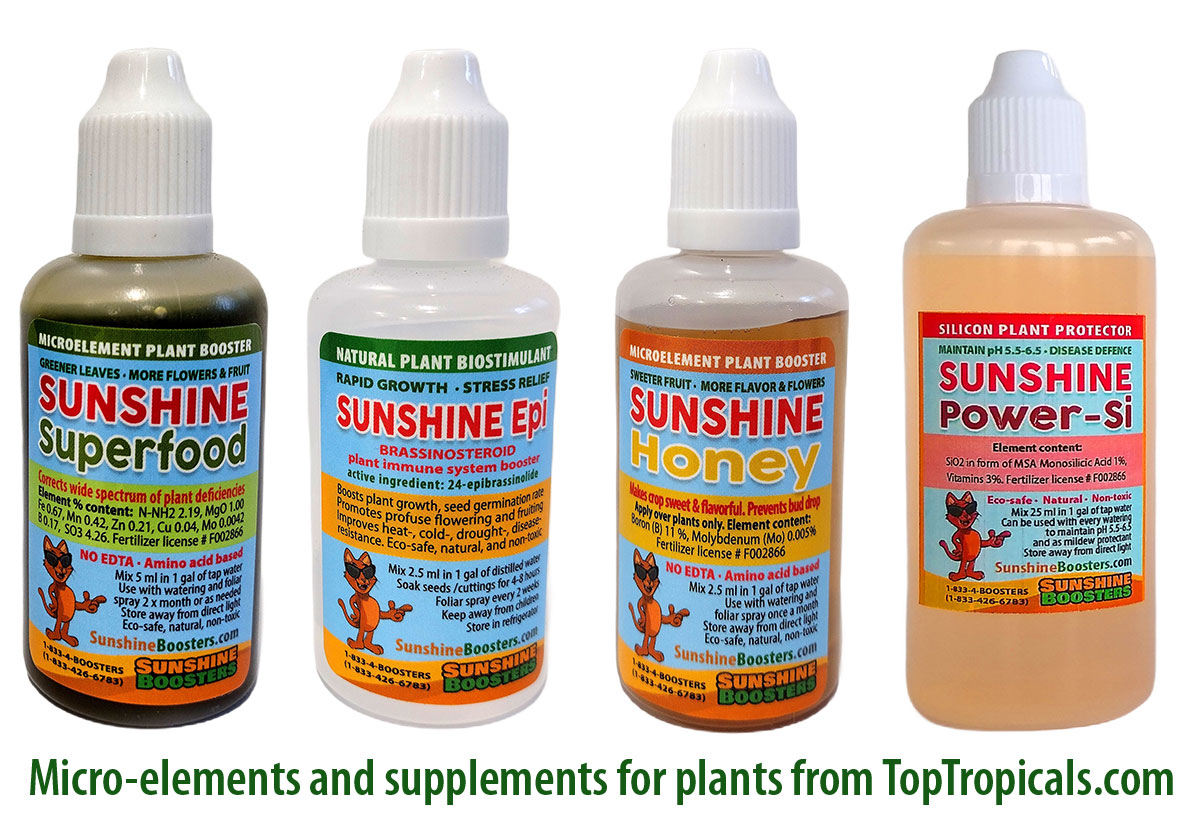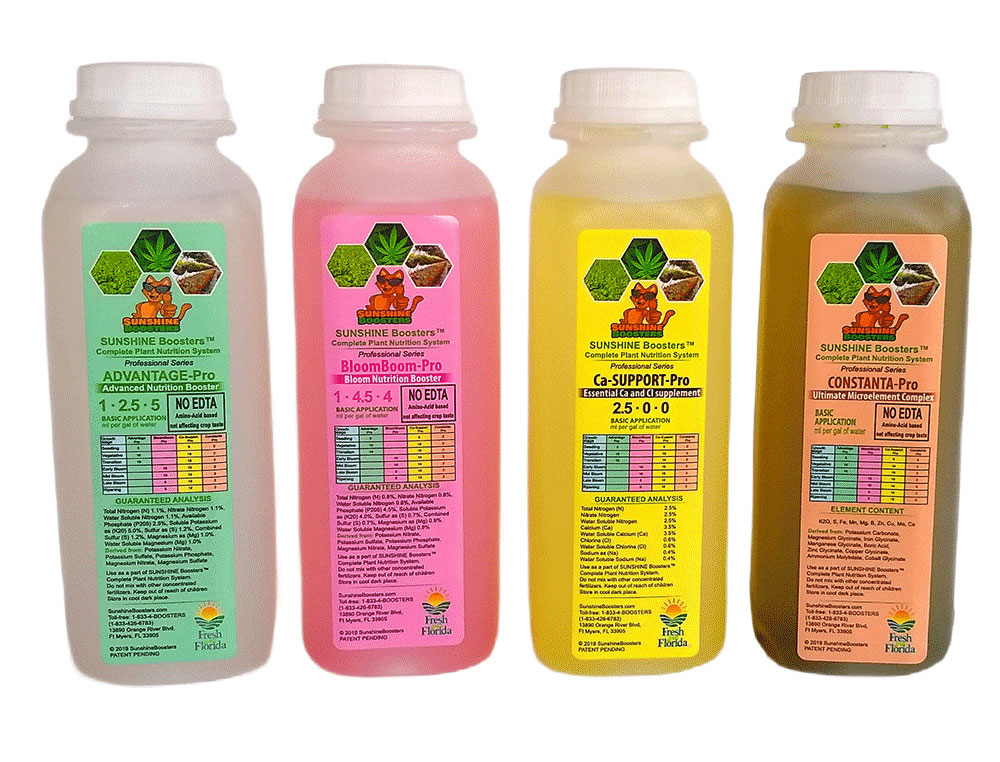Date: 18 Oct 2019
Using SUNSHINE Complete Nutrition System
For hydroponics and potted plants
Q: I recently bought both the 5ml of the sunshine epi and the 100 ml advanced nutrition kit. I read on the paper for the Epi not to use any other strong fertilizers along with this but I was wondering if it'd be alright to use both this foliar spray and nutrition watering together?
A: All solutions in SUNSHINE Booster Nutrition System (NPK-macro and micro-boosters) are
compatible.
The only exception is Sunshine-Epi - brassinosteroid bio-stimulant. Epi
should be mixed with distilled water separately from other boosters. The
reason is, it is very bio-active, and if mixed with other compounds, oxidizes
quickly which may affect its performance.
Sunshine-Epi solution must be prepared using distilled water and applied as foliar spray only (it only works on contact with leaves and not through the root system). Epi shows extremely impressive results when you apply it before the application of other nutrients because it increases plant metabolism; so all boosters become even more effective if you spray Epi the day before.
When using Micro- and Macro-boosters, you may mix all components in one watering can/tank (except for Epi), using regular tap water. Besides watering root ball, the macro-micro solution can be also used for foliar spray. It is optional, as in some circumstances growers prefer to keep leaves dry at all times: to stay away from mold, fungus and other issues caused by the wet environment.
Here is an example of Sunshine Boosters Nutrition System application:
1. Daily watering in one can: NPK 25 ml/gal (one of 5, depending on growth stage) + Constanta 5 ml/gal + Ca-Support 5 ml/gal, mixed in tap water
2. Every 2 weeks: spray Sunshine-Epi 2.5 ml/gal - to boost the immune system and growth rate,
mixed in distilled water
3. From daily to every 2 weeks: Sunshine-Power-Si 25 ml/gal to protect from diseases and keep pH at
5.5-6.5. Can be used as often as daily and mixed with a daily watering solution
(1)
4. As needed: Sunshine SuperFood and GreenLeaf - for correcting deficiencies. Can be also mixed with the
daily solution (1)
Make sure to prepare a solution right before use and do not store solution for more than 1 day. Keep concentrates and solutions protected from bright sunlight.
Here is also advanced information on Sunshine Boosters compatibility.
Date: 15 Jan 2021
Healthy Plants: Q&A from Mr Booster
New Boosters for the New Year!
Sunshine Total Feed: Orchidasm and Citron
How to grow everblooming orchids?
Q: I ended up with a large collection of orchids that I was given as presents... They grow well but unfortunately after the showy blooms were gone, I don't see any more flowers, just green leaves. What do I need to do to make them bloom again? Should I fertilize them with Azalea bloom booster?
A: Orchids culture is different from garden ornamental plants. First big difference, they are epiphytes, growing in a loose bark medium rather than soil, and
benefit from daily mist. Second difference is a type of fertilizer. You can not use a regular garden fertilizer on orchids,
because they are very sensitive to salts. Orchids need special, acidic type of fertilizer, very mild in action.
Luckily, Sunshine Boosters formulas are exactly what orchids need! They are amino-acid based, have very mild formulas, and do not create nutrient lock up (building up salts is one of the biggest
enemies of tender orchids).
A new Sunshine Boosters Orchidasm TotalFeed is scientifically balanced orchid food that contains all
necessary nutrients, including micro-elements, for healthy, happy, vigorous orchids. It can be used as often as daily with every foliage spray. From our testing experience, after using Orchidasm Booster, orchids not only got happy and thriving -
they also bloom more often - up to several times a year, shooting new flower spikes one after another! (while normal blooming cycle for most
orchids is once a year). It gets even better - the flower display lasts twice longer!
To enjoy these beautiful flowers year around - treat them with Love, give them some
Orchidasm!
See more information with pictures in Sunshine Boosters Orchid Blog
Secrets of a healthy Citrus tree
Q: We planted several citrus trees in our yard - Meyer Lemon, Grapefruit and Blood Orange. The trees came from the store full of flowers and even had a few fruit, but a year after planting - no more flowers! The old leaves are green, but new growth doesn't look healthy, leaves are yellowish and have spots, maybe eaten by bugs (?), and how do we get them to fruit?
A: Citrus plants are not the easiest trees to grow; they are susceptible to various diseases, pests, and deficiencies, especially in areas with high humidity/rainfall like Florida.
Fungi, viruses, leaf minors, chlorosis - this is not a complete list of citrus common problems. In commercial groves, these conditions are kept under
control by using harsh chemicals on solid schedule.
For home gardeners, growing citrus trees may become a challenge. Many people don't want to use harsh
chemicals on their edibles; and those who do, may not always have time to apply treatments on a professional schedule. So as much as we all love a fresh juicy orange,
growing your own may become quite a pain!
Sunshine
Citron TotalFeed is your simple, eco-safe solution to a healthy looking, productive citrus tree with organic fruit! Amino-acid based formula provides all
necessary elements to strengthen the tree and make it resistant to possible problems.
Did you know that treatment of leaf chlorosis (yellow leaves with dark
green veins), commonly treated with iron supplements, in fact requires a complex combination of nutrients - both balanced NPK and micro-elements?
Use Sunshine Citron in combination with Sunshine GreenLeaf and
Sunshine SuperFood and never see yellow chlorotic leaves again!
Apply Sunshine Epi on regular basis (every 2 weeks) and help your tree boost its immune system and stay virus-free.
Add Sunshine Honey, and you will have large, juicy fruit that
are much sweeter and more flavorful than those from the store! All these boosters are compatible with each other, and perfectly natural. Eat your fruit safely and enjoy...
Read more about treating citrus tree defficiencies in Sunshine Boosters Citrus Blog.
Date: 21 Feb 2020
When plants are ready for a meal?
Q: We have an early Spring here in Florida. All plants in my garden flushing out new leaves and buds opening. Can I start fertilizing? I have Mango, Avocado, Peach trees, many medicinal herbs and flowering shrubs: Angel trumpets, plumerias, bromeliads. I prefer mild organic fertilizers; can you suggest something that is safe for edibles and butterflies?
Q: As a rule of thumb, tropical gardeners start regular fertilizing when the minimum temperatures (at night) go above 65F. Keep in mind that Sunshine Boosters fertilizers can be applied year around because they have mild formulas and used with every watering; during cooler period, you water less frequently, so feeding is reduced accordingly. Another advantage of Sunshine Boosters - they are natural (derived from organic amino acids which is the basics of Life). They are safe for edibles as well as pollinating insects.
Here is the feeding plan for your plants:
1. The most universal solution for all plants (both potted and
in-ground): get a complete set of Sunshine Boosters Pro system: Advantage-Pro for vegetative growth, BloomBoom Pro for flowering stage, and Ca-Support-Pro + Constanta-Pro as necessary daily supplements. You will need all these 4
components for your garden.
2. Start adding these liquid boosters with every watering according
to dozing directions and you will notice amazing growth boost within a
week.
3. Apply Sunshine Epi plant hormone every 2 weeks as a foliar spray to boost
immune system and metabolism of plants and protect them from diseases. Epi
makes plants (especially young plants and those "waking up" from dormancy)
grow twice faster! It also enhances effect of fertilizers by increasing plant
metabolism.
4. After cool winter temperatures, some plants may develop element
deficiencies like chlorosis (yellowing leaves). Additional microelement boost
can be provided with Sunshine Greenleaf (iron supplement) and Sunshine Superfood (micro-elements).
5. For additional boosting of flowering and setting fruit, use the
following individual boosters:
Sunshine Robusta - for foliage plants and when you need rapid vegetative
growth
Sunshine TotalFeed - for Plumerias and other fragrant plants
Sunshine Megaflor - for Brugmansias and other flowering heavy feeders
Sunshine C-Cibus - for improving fruit production and quality
Sunshine Honey - for sweeter fruit (must be applied 4-5 times a year)
6. For young/small plants (seedlings, rooted cuttings) as well as
tender tropicals like bromeliads, and orchids - Sunshine Bombino is a perfect choice due to its mild formula.
7. To save money, order complete sets rather than individual
boosters; you will be able to safe up to 40%! Sunshine Complete Nutrition System
Kits: Combo
Kit, and Pro Kit.
If you are a fan of organic gardening, do not use dry fertilizers. While water-soluble and granulated (smart-realease) fertilizers are popular choice in plant nurseries due to their convenience, they are not as safe as liquid boosters because they create salt build-up in soil and have a high risk of overdosing/burning plant roots, especially potted plants, plants at breaking dormancy, at establishing, and at early stages of plant development. Besides, dry fertilizers may affect the taste of your fruit and herbs. See advantages of liquid boosters over dry fertilizers.
Learn more about Sunshine Nutrition System - a Natural solution for your garden.
Date: 27 Feb 2025
What
Fertilizer to Use Now and How?
Five important keys to healthy plants
Q: It's early Spring this year. Should I start fertilizing my plants sooner than usual?
A: Most fertilizer instructions recommend fertilizing tropical plants from March to November. This is because plants don't need as much food during the cooler months when many go dormant, and excess nutrients can burn the roots if not absorbed. However, for the most effective fertilizer program and healthy plants, consider these points:
1. Sunshine Boosters Year-Round
Liquid amino-acid-based fertilizers like Sunshine Boosters are safe to use year-round. Since watering is reduced in cooler weather, the intake of water-soluble fertilizer is also lower, providing plants with just the essential nutrients for their minimal needs.
2. Dry Fertilizer Schedule
Be cautious with dry fertilizers. Apply them only during active growth in the hot season.
3. Temperature Is Key
If March is still cold, delay dry fertilizer use. However, if nighttime temperatures in February stay above 65F, you can start a dry fertilizer program using slow-release, granulated plant food.
4. What Fertilizers to Use and How
Check out our Sunshine Boosters selection for different types of plants and choose the right type for your needs. These can be applied as often as with every watering:
For Rapid Growth
Sunshine Robusta - Rapid Growth Booster: general fertilizer for both foliage
plants and small starters that need an extra boost.
For Flowers
Sunshine Megaflor - Bloom Booster: boosts flowers on established plants; and Sunshine Pikake - Fragrant Plant Booster: best for fragrant flowers.
For Fruit Trees
Sunshine C-Cibus - Crop Booster: contains all necessary elements for fruit trees and their production. Sunshine Mango Tango - specifically formulated for Mango and Avocado
trees, and Sunshine Citron - ideal for citrus trees.
For Tender Perennials
Sunshine Orchidasm - Orchid Total Feed and Sunshine Ananas - Pineapple and Bromeliad Booster: mild formulas for these tender perennials.
5. Microelement Supplements Are a Must
Besides macronutrients, plants need additional microelements, just like humans need vitamins. Be sure to apply these supplements along with your regular plant food:
For Green Leaves and Health
Sunshine SuperFood - Complex Microelement Supplement: a
must for healthy plants. Apply once a month.
For Stress Relief
Sunshine-Epi - Brassinosteroid Plant
Hormone: essential for plants recovering from stress (shipping, transplanting,
drought, insect damage, cold stress, etc.). Apply as needed.
For Sweeter, Bigger Fruit
Sunshine Honey - Fruit Sugar Booster: application on fruit trees will make
fruit bigger and sweeter by directing sugars to the fruit from other plant parts, and helps to prevent bud
drop. Apply 4 times a year: at bud setting, flowering, fruit setting, and
after harvesting.
For Better Resistance
Sunshine Power Si - Silicon Protector - enhances resistance to insects, diseases, drought, and frost, while boosting growth. Apply once a
month, along with Sunshine SuperFood.
Need Help? Our Plant Experts Are Ready to Assist!
Macro and Micro elements
Plants, like living organisms, require adequate nutrition for grown. The concept of plant nutrition includes the following substances:
Carbon dioxide. In the process of photosynthesis with the participation of chlorophyll, in the leaves of plants from water, carbon dioxide and light, organic compounds are formed that participate in the construction of the organism. This is the main and only significant source of organic matter for plants.
MACRO-elements. The macroelements include inorganic compounds necessary for the vital activity of a living organism. The prefix macro-means a relatively high content of these elements in the composition of plants, respectively, their high demand. The macroelements include: carbon, hydrogen, oxygen, sodium, potassium, chlorine, sulfur, calcium, magnesium, nitrogen and phosphorus.
Liquid Sunshine Boosters - Mild stable formulas, can be used year-around. Organic acid-based, Sunshine Boosters are perfect for organic gardens, edibles and do not affect crop pure taste. Amino-acid stable formulas have NO EDTA chelators to eliminate nutrients lockup in soil. Pollinating insects friendly. Designed for continuous use, Sunshine Boosters contain no excess salts, maintain soil pH at optimal level (5.5-6.5) and do not require soil flushing or additional pH regulators. They can be use with every watering, year around.
Water-soluble fertilizers - dry (powdered) fertilizers that must be diluted in water before use. EDTA-chelated. Can be used only during hot weather, during active growth season.
Smart release (granulated) fertilizers - Slow-release during 1-3-6-12 month period. EDTA-chelated. Can be used only during hot weather, during active growth season.
MICROelements. Microelements are inorganic compounds involved in the synthesis of enzymes and biologically active substances. The content in a living organism is very low, but they play a vital role in the life of plants. The microelements include: iron, manganese, zinc, copper, boron, molybdenum, cobalt.
ULTRA-microelements. Very small amounts of almost all elements of the periodic table are contained in all organisms. They fall into plants with root nutrition from the soil. The necessity for the life of ultramicroelements is not fully proved. Of more or less necessary are considered: vanadium, iodine, nickel, titanium, aluminum, cadmium, fluorine (for plants).
See full article: The role of elements in plant nutrition.
Fertilizers, or Plant Food, contain macro- and micro-elements, for example:
Macro-elements: Nitrogen (N), Phosphate (P), Potassium (K).
Micro-elements: Boron (B), Molybdenum (Mo), Copper (Cu), Iron (Fe), Manganese (Mn), Zink (Zn), Sulfur (S).
Application: Follow directions on the labels. Do not exceed the recommended dose. Less concentration is always better than overdose. Generally, for tropical plants, dry fertilizers should be used only during the growth period when temperatures are above 65F, and Amino-acid based liquid fertilizers can be used year around.
See also: Plant Growth Hormones
For more information about Sunshine Boosters, see SUNSHINE BOOSTERS PAGE and learn more about Essential Nutrients.
See detailed plant profile in new window: https://toptropicals.com/catalog/uid/fertilizers.htm
